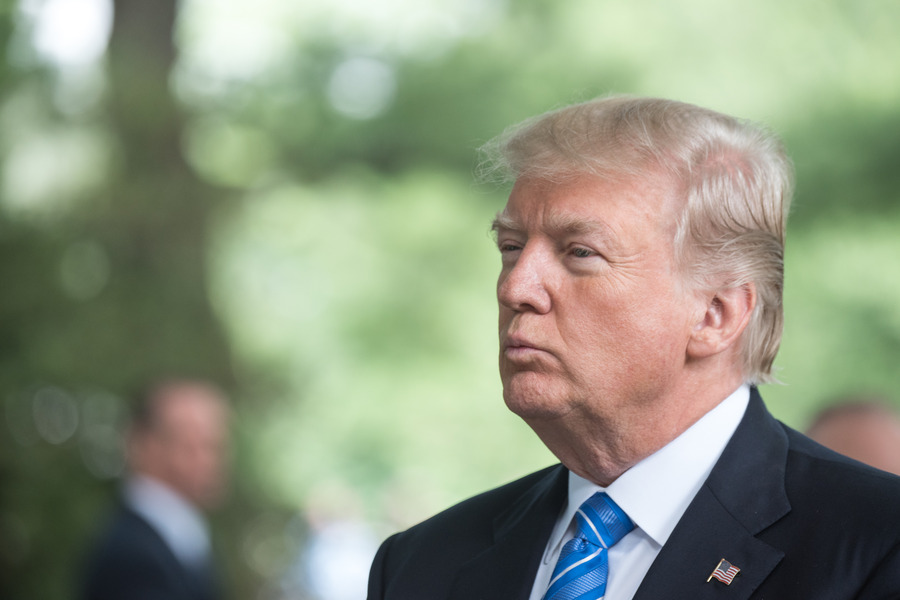The Executive Branch's Extraordinarily Broad View of the Presidential Pardon Power
Article II gives the president the “Power to grant Reprieves and Pardons for Offenses against the United States, except in Cases of Impeachment.” There has long been speculation that President Trump may exercise this power to pardon some of the Russia investigation characters, including Michael Flynn, Paul Manafort,
Published by The Lawfare Institute
in Cooperation With

Article II gives the president the “Power to grant Reprieves and Pardons for Offenses against the United States, except in Cases of Impeachment.” There has long been speculation that President Trump may exercise this power to pardon some of the Russia investigation characters, including Michael Flynn, Paul Manafort, Michael Cohen, Jared Kushner, and possibly even himself.
The pardon power is among the broadest of presidential powers. As the Supreme Court noted in 1866 in Ex Parte Garland, “If granted before conviction, [a pardon] prevents any of the penalties and disabilities consequent upon conviction from attaching; if granted after conviction, it removes the penalties and disabilities, and restores him to all his civil rights.” The court added that the pardon power “is not subject to legislative control. Congress can neither limit the effect of his pardon, nor exclude from its exercise any class of offenders. The benign prerogative of mercy reposed in him cannot be fettered by any legislative restrictions.” More recently, the court in its 1974 decision in Schick v. Reed stated that the president’s pardon power “flows from the Constitution alone, not any legislative enactments,” and “cannot be modified, abridged, or diminished by the Congress.”
While there are a handful of important Supreme Court decisions on the scope and effect of the pardon power, in the first instance that scope and effect is determined by the executive branch itself. The Justice Department has issued many opinions about the president’s pardon power. In recent decades, the Office of Legal Counsel issued these opinions; in earlier years, the attorney general’s office did so. The opinions presumptively bind the executive branch. However, issues related to a pardon might be subject to judicial review by courts, which are not bound by executive branch interpretations of the pardon power.
In Part I below, we have collected and summarized the publicly available opinions most relevant to the Russia investigation. These opinions show that the executive branch interprets the president’s pardon power to be extraordinarily broad in ways that might become relevant to the Mueller investigation. After briefly describing these opinions and their relevance in Part I, we list in Part II all of the other published Justice Department pardon opinions, with links.
- OLC Pardon Opinions Potentially Relevant to the Russia Investigation
Whether the President May Have Access to Grand Jury Material in the Course of Exercising His Authority to Grant Pardons (2000): The question before OLC was whether the Justice Department’s pardoning attorney can access grand jury information protected by Federal Rule of Criminal Procedure 6(e) when making a pardon recommendation to the president. It concluded that the president, “in the exercise of his pardon authority and responsibilities under Article II,” may request that the pardon attorney consider such information in a pardon recommendation if the president “determines that his need for such information in considering that application outweighs the confidentiality interests embodied in Rule 6(e).” OLC reasoned that the application of Rule 6(e) in this context “conflicts with the president’s interest in having access to information that is legitimately in the possession of his subordinates and relevant to the exercise of his constitutionally enumerated and exclusive pardon power.” OLC further ruled that the president may issue a standing request for certain grand jury material on particular issues that may be relevant to a pardon decision.
This opinion would be relevant should President Trump seek to leverage the pardon power to examine grand jury material in the Russia investigation.
Assertion of Executive Privilege With Respect To Clemency Decision (1999): OLC here addressed whether the president can assert executive privilege in response to subpoenas by Congress seeking documents and testimony concerning the president’s pardon decisions. It concluded that he can do so, since the documents and testimony concerned advice and deliberative communications that fall under the scope of executive privilege. When a congressional committee wants to subpoena information protected by executive privilege, OLC reasoned, it must demonstrate that the information is critical to fulfill the committee’s function and furthers legitimate legislative responsibilities of Congress. Congress has no power to review pardon decisions, however, as the pardon power rests exclusively in the executive’s hands. Thus, reviewing the communications isn’t critical to Congress’ function. Executive privilege also renders close advisers to the president, such as his counsel, absolutely immune from compulsion to testify before a congressional committee in this connection.
This opinion would be relevant should Congress seek to examine the basis for any of Trump’s pardon decisions through subpoenas or testimony by executive branch officials.
Effects of a Presidential Pardon (1995): This opinion addressed many issues related to the pardon power, but the one most relevant to current events is whether a pardon issued prior to conviction has the same effect as a pardon issued after conviction. Citing a long line of Justice Department opinions as well as Garland, OLC concluded that a pardon removes all consequences of an offense even where there has not yet been a conviction. OLC cited two famous precedents for this conclusion: President Jimmy Carter’s pardon of those who avoided military service during the Vietnam War, and President Andrew Johnson’s offer of pardons to persons involved in secession who were willing to take a loyalty oath. Indeed, OLC noted that “the vast majority of those pardoned had not been convicted of any crime.”
The opinion has relevance should President Trump wish to pardon someone under investigation by Special Counsel Robert Mueller prior to any indictment or conviction, for offenses committed before the pardon.
Pardon of the President (1974): In this opinion OLC addressed whether a president can pardon himself. The entirely of its analysis on that question was as follows: “Under the fundamental rule that no one may be a judge in his own case, it would seem that the question should be answered in the negative.” OLC further ruled that the president can use the 25th Amendment to declare that he can’t perform his duties, and then resign from office. Then the vice president, who would serve as acting president, could pardon him.
This opinion would be relevant if President Trump tried to pardon himself, or if he resigned and his successor wanted to pardon him, as Ford pardoned Nixon.
Amnesty - Power of the President (1892): This opinion by Attorney General William Howard Taft addressed whether the president could grant amnesty to all people who lived in the Utah Territory who were guilty of polygamy, cohabitation, or adultery. Taft concluded that the president can issue a general pardon to a broad class of people without looking into an individual’s particular circumstances. He reasoned:
It has been decided by the Supreme Court that the power ... conferred upon the President [by the Pardon Clause] is unlimited (ex parte Garland, 4 Wall., 333). The pardon may be granted before or after conviction, and absolutely or upon conditions. The ground for the exercise of the power is wholly within the discretion of the Executive. He may, therefore, if he thinks fit, pardon an offender because his offense is one of many like offenses, arising from a widespread, popular feeling and without regard to the character or the particular circumstances of the individual. He may, for the same reason, grant, by separate acts of pardon, immunity from punishment to each of a thousand such offenders. If he may do so, it is difficult to see why he does not exercise the same power, when by public proclamation he extends a pardon to ten thousand offenders, without naming them, but describing them as persons committing, or participating in, the same kind of offenses.
In response to the worry that this conclusion “intrusts too great a power to the Executive,” Taft stated:
It only enables him to do that in one act which he might do by a thousand. The power which the Executive exercises is still the pardoning power, and that the Constitution gives him. It is no argument against its exercise that it may be abused. That is true of every power intrusted to the Executive.
This opinion would be relevant should President Trump seek to pardon everyone (or many people) under investigation by Mueller, including for different crimes. There are other precedents, not discussed in published Justice Department opinions, that are germane to this issue. For example, in December 1992 President George H.W. Bush pardoned former Secretary of Defense Caspar Weinberger and five other persons (Elliott Abrams, Duane Clarridge, Alan Fiers, Clair George, and Robert McFarlane) for conduct related to the Iran-Contra affair. The pardon covered “all offenses charged or prosecuted by Independent Counsel Lawrence E. Walsh or other member of his office, or committed by these individuals and within the jurisdiction of that office.”
- Other Department of Justice Pardon Opinions.
We thought it would be useful to collect all of the Justice Department’s publicly available pardon opinions in one place, even if they are not directly relevant to the Russia investigation. Here are the others:
- Whether a Presidential Pardon Expunges Judicial and Executive Branch Records of a Crime (2006)
- Legislative Proposal to Nullify Criminal Convictions Obtained Under the Ethics in Government Act (1986)
- Effect of Presidential Pardon on Aliens Who Left the Country to Avoid Military Service (1977)
- Presidential Authority to Act in the Case of Eddie Slovik (1977)
- Pardoning Power of the President (1955)
- Effect of Pardon on Statute Making Persons Convicted of Felonies Ineligible for Enlistment in the Army (1938)
- Offenses Committed Under Section 504, World War Veterans’ Act – Effect of Pardon (1930)
- Naval Officers – Promotion – Constructive Pardon (1919)
- Naval Service – Desertion – Pardon (1918)
- Pardon – Removal of Disabilities – Pension (1909)
- Enlistment in the Navy – Desertion – Pardon – Reenlistment (1908)
- Naval Officers – Relative Rank – Pardon (1903)
- Army – Enlistment – Pardon (1898)
- Attorney-General – Deserter from the Army (1897)
- Pardon (1895)
- Pardon (1890)
- Court Martial – Pardon (1888)
- Pardon – Lawton’s Case (1885)
- Pardon (1884)
- Effect of Pardon (1875)
- Effect of a Pardon – Remission of Fine (1872)
- Pardon for Desertion (1872)
- Applications for Pardon (1872)
- Effect of President’s Pardon (1869)
- President's Pardon (1866)
- Pardoning Power (1865)
- Pardoning Power of the President (1863)
- Effect of Pardon (1860)
- Effect of Pardons (1857)
- Pardons (1856)
- Pardoning Power (1855)
- Constructive Pardon (1854)
- Pardoning Power (1854)
- Passenger Laws – Pardoning Power (1854)
- Passenger Laws – Pardoning Power (1854)
- Court Martial – Pardon (1853)
- Pardoning Power of the President (1853)
- Pardoning Power of the President (1852)
- Pardoning Power of the President (1852)
- Application for the Pardon of See-See-Sah-Ma (1851)
- Power of President to Mitigate Sentences of Courts-Martial (1845)
- Pardon of Jenkins Advised (1843)
- Respecting the Pardon Power (1841)
- Reprieves and Pardons (1839)
- Pardons and Remissions of Forfeitures (1830)
- Pardons (1829)
- Conditional Pardon (1821)
- Pardon of Piratical Murder (1820)
- Power of President to Mitigate Sentence of Death (1820)
- Assurance of Pardon (1797)



.jpg?sfvrsn=fcfb5b78_9)
.png?sfvrsn=b3d4b1bc_5)

